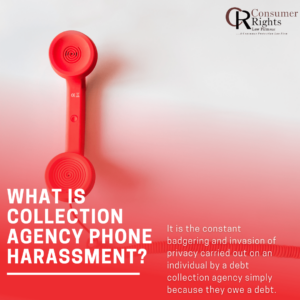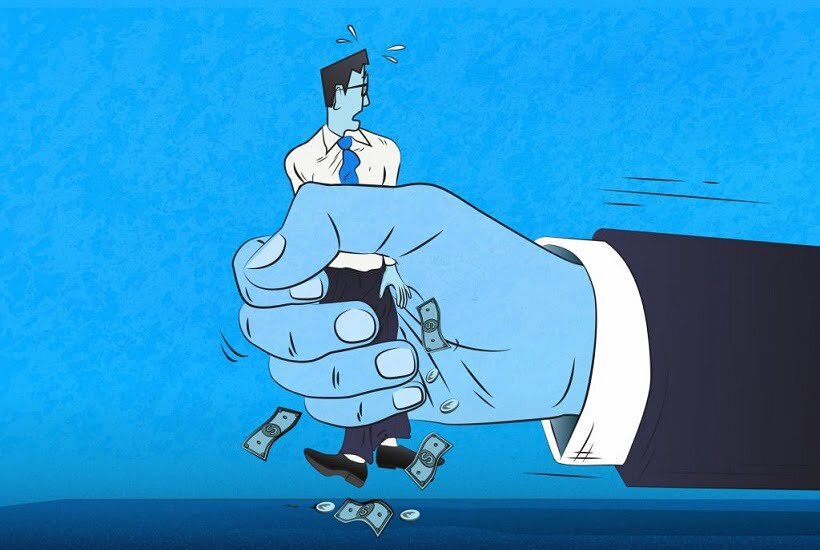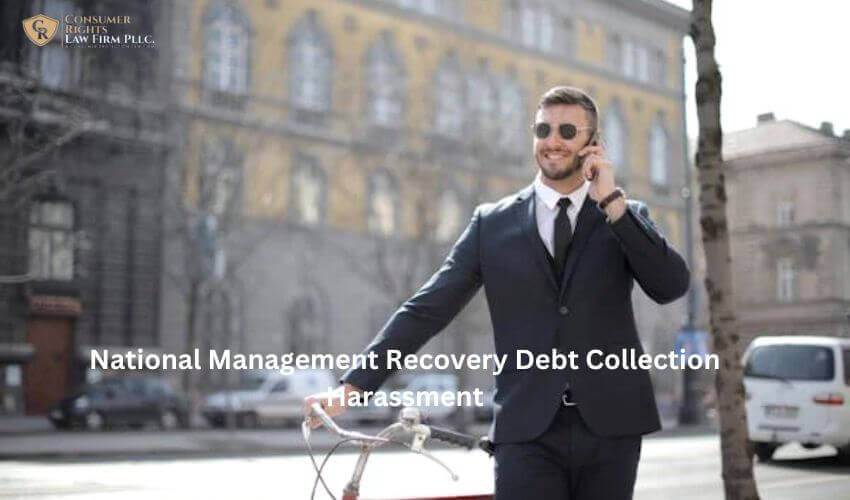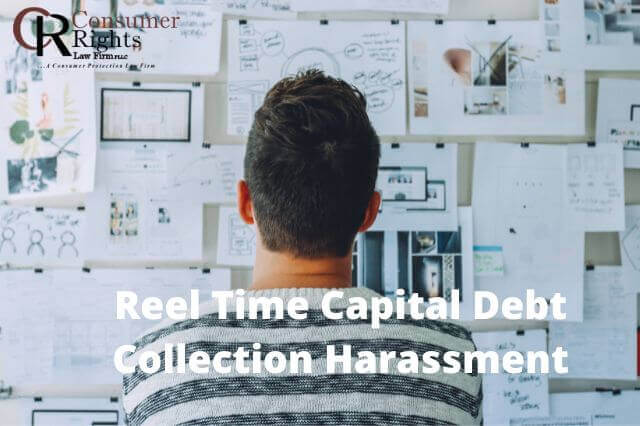Do you need to stop Collection Agency Harassment?
Collection Agency Phone Harassment is the constant badgering and invasion of privacy carried out on an individual by a debt collection agency simply because they owe a debt. This act can come in many forms, such as credit card harassment, collection call harassment, and several other forms of debt harassment like misrepresentation or tampering with your credit report.
If your phone rings every day, or even several times per day because debt collectors are calling you to demand payment, then you may be facing collection harassment, and you should know that you are entitled to sue debt collectors for harassment. If you will like to file a debt collector harassment lawsuit to deal with the creditors’ harassment, then that is something we will be happy to help you with. Reach out to our office immediately at 877-700-5790.
To know if you are a victim of harassing calls from debt collectors, ask yourself the following:
• Is a debt collector threatening you with legal action or wage garnishment?
• Has a debt collector ever used abusive or profane language when speaking with you on the phone?
• Do they make false claims about themselves or the debt they claim you owe?
• Do you receive harassing collections calls at odd hours of the day?
If you have answered yes to one or more of these questions, you may be a victim of collection agency harassment, and you should consider filing a collection agency complaint or suing debt collectors for harassment, as the debt collector may be violating your legal rights. Take back your life and stop collection agency phone harassment. Call us now.

Debt Collection Is Big Business
Do you know why nobody can seem to stop collection agency harassment? Because debt collection is a $40 billion dollars a year business in the US. Owing to this fact, collection agencies will often cross the line as to what they can legally do to collect on debt because it will increase their bottom line in a cut-throat industry.
Due to these illegal tactics, Congress created the Fair Debt Collection Practices Act or the FDCPA. The FDCPA is a federal statute that regulates how 3rd party collection agencies can contact consumers and protects consumers from unfair collection practices. If a collection agency violates the FDCPA, you may be eligible to receive up to $1,000.00 in statutory damages, plus all of your attorney fees and costs.
Thousands of collection agency complaints are raised each year by consumers that have been harassed. Often these claims result in the script being flipped and the collection agencies paying money damages to the very people they were trying to collect from for the illegal harassment.
We can help you stop collection agency phone harassment if you give us a call today.
How to sue debt collectors for FDCPA violations
Simple answer? Yes.
You are permitted to file an FDCPA lawsuit about harassment from debt collectors on both a state or and a federal level. As a firm experienced in dealing with collection harassment, we know that some states provide additional protections against creditor harassment, therefore if you file a complaint against a collection agency in a state court, those protections will apply to you in addition to the FDCPA laws.
Nevertheless, the FDCPA is a federal law, and the debt collection agency in question may ask that the matter be moved to a federal court. In a nutshell, when it comes to the matter of how to sue a debt collector for harassment, you are better-off speaking with a qualified lawyer who will be able to provide you with tailored guidance.
Can a collection agency sue you?
As much as you can sue a collection agency, a collection agency can also sue you over the non-payment of your debts.
If you receive a court summons from a collection agency, it is wise not to ignore it. Read it carefully and get in touch with a consumer rights attorney immediately. You may think that ignoring it will make it go away, however, it will only lead to more serious and unintended consequences.
Do you need a lawyer?
In the most basic sense of the question, you do not need a lawyer to help you file a complaint against a debt collector or sue them to court, nevertheless, the professional experience that retaining the services of an attorney brings to the table is priceless.
A lawyer is trained to represent you adequately before the court. They are also experienced in dealing with legal terminology, process, and paperwork. What’s more is that they will give you priceless advice to help you win your lawsuit and stop collection agency phone harassment for good.
If you are worried about the financial implications of hiring an attorney, then we have great news for you: you can hire us to represent you for absolutely no cost at all! How? Once we are able to prove that you are facing harassing collections calls, the collection agency responsible for placing those calls will bear the cost of our attorney fees, alongside other damages and court costs.
To sue debt collectors for harassment, you will need to retain the services of an experienced firm. We have a team of consumer protection lawyers that have been fighting scary debt collection agencies and winning victories for clients for over a decade. What better firm to trust than one that has been dealing with issues pertaining to debt collection harassment for over ten years? What better firm than us?
Will you be rewarded if you sue debt collectors for harassment in an FDCPA Lawsuit?
Suing debt collectors for harassment can potentially offer you many benefits, some of which include monetary compensation for damages and peace of mind from collection agency phone harassment. If you retain us as your consumer protection lawyers, we will prove a valid case of debt collection harassment (if there is one) and bring and recover the following on your behalf:
• Damages for any loss or inconveniences caused
• Compensation for lost wages
• Unlawful wage garnishments
• Excess amounts of debts paid wrongfully
• Any other monetary loss
You will also be awarded up to $1000 in statutory damages, in addition to the actual damages cited above, and a chance to stop collection agency phone harassment for good.
10 of the common ways Collection Agencies violate the law
There are many, many ways that collection agencies violate the law and harass good people. Below are 10 of the more common ways that collection agencies brake the law.
1. Collection agencies cannot call before 8:00 am or after 9:00 pm.
2. They cannot call you at work if you tell them to stop. this includes calling your cellphone during working hours if you tell them.
3. Collection agencies must tell you they are a debt collector and that they are trying to collect a debt.
4. They cannot swear or use profanity at any time.
5. Cannot threaten a lawsuit, garnishment, or judgment if they do not have the ability or intention to do so.
6. They cannot add extra erroneous fees to increase the balance owed on the debt.
7. Collection agencies cannot continue to call you after you have told them to only communicate in writing.
8. Cannot threaten to take your property or harm you in any way.
9. They cannot leave threatening voicemails.
10. Collection agencies cannot disclose the debt to anyone not part of the debt. This includes family, friends, neighbors, and co-workers.
Companies that use any of the tactics above or in some other way harass consumers to get payments are violating the law. If this is happening to you, there is a way to stop it. There is a way to not only stop the harassment but also possibly get money damages. Contact us now to speak to one of our legal professionals to see if we can help stop the collection agency phone harassment.
How many calls from a debt collector is considered harassment?
There is no legally specified number of harassing collections calls that you will have to receive in order to have a valid case of debt collection harassment; even one call can feel intimidating enough.
However, the rules in some states say that a debt collector cannot make calls to your phone in the excess of 7 times within the space of 7 consecutive days. They may also not place a call to you within 7 days of talking to you about the same debt in question can be classified under collection agency phone harassment.
How to report debt collector harassment
If you do not wish to hire any consumer protection lawyers, then it may interest you to know that laws such as the FDCPA provide an outlet for you to stop collection agency phone harassment by reporting the agency to a government or legislative body. Follow the steps outlined below to know exactly how to report a debt collector that is harassing you.
How do I file a complaint against a debt collector?
• Report them to the Consumer Financial Protection Bureau and file a complaint
If you find a collection agency to be in violation of the FDCPA, you are well within your rights to report them to the Consumer Financial Protection Bureau and file a harassment complaint.
The CFPB checks and monitors the consumer finance industry by enforcing certain rules and regulations that protect the rights of consumers like you. They will take your complaint up because their job is to make sure that your rights are adequately protected.
• Contact the Federal Trade Commission
The Federal Trade Commission another agency interested in ensuring that your rights are protected. The FTC not only protects you, but also makes laws that govern debt collectors should conduct business. In addition, the FTC ensures that the financial industry is a fair playground where debt collection laws are strictly abided by.
• Get in touch with your state’s Attorney General
As we mentioned earlier, your state may have its own set of rules and protections that shield you even further from debt collection harassment in addition to the FDCPA.
You can find out more about these laws by reaching out to the office of your state’s Attorney General and file a complaint if you find the debt collector contacting you to be in violation of these laws and you need to stop collection agency phone harassment.
• Get in touch with the BBB to file a complaint
The BBB is an independent body that provides consumers with insight regarding a business’s conduct while going about their operations. They are fair, unbiased, and they provide you with a trustworthy platform to give an honest review of the relations with your debt collector.
You can file a complaint against a collection agency with the BBB, and that can help you stop collection agency phone harassment, especially if the business cares about their reputation and standing with the Better Business Bureau.
I owe someone money and they are harassing me, is this covered by the FDCPA?
Although personal debts are covered by the FDCPA, they have to be in collection with a third-party collection agency. This means that debts that are simply an agreement between two or more individuals can hardly be covered by the FDCPA, as the first condition (the involvement of a third-party collector) in unlikely to be in place.
If you need information about what to do if someone is harassing you for money, and their harassment is making you feel unsafe, then we advise you to contact your nearest police station for help and further guidance.
How to stop harassing calls from debt collectors for good
If you need to stop collection agency phone harassment, you can easily do so in writing through what is called a cease-and-desist letter. This, in essence, is a letter to the collection agency harassing you, asking that they cease all further communications with you.
You should write this letter and send it by certified mail in order to get a return receipt as proof that the collection agency received your letter, just in case they choose to ignore it and you may need to go to court. Once the collection agency receives your letter requesting that they cease all communication with you, they are prohibited from contacting you again, except for either of the following reasons:
1. To inform you that your letter has been received agreed to, or
2. To inform you of their intent to take legal action against you
Sending a cease-and-desist letter will stop collection agency phone harassment, nevertheless, it will not end the debt. You need to be aware that your debt is still active, and the debt collector still expects to receive payments. They can also still sue you if you fail to meet up with your debt payments, despite the fact that you sent them a cease and desist letter.
Additionally, you can contact the FTC to put your number on the “Do Not Call” registry, especially if you suspect that you are being contacted by fraudsters posing as a legitimate debt collection organization.
CONSUMER RIGHTS LAW FIRM, PLLC
Consumer Rights Law Firm, PLLC is a law firm that specializes in helping clients who are facing harassment from debt collectors stop collection agency phone harassment, and all other forms of harassment associated with being in debt. Rather than suffer alone, contact a legal professional to stop the harassing phone calls.
If you are interested in learning more about how to stop harassing calls from debt collectors, call us at (877)700-5790 for immediate assistance or check out Debt Collection FAQs to find answers to most of your questions about debt collection rights.




